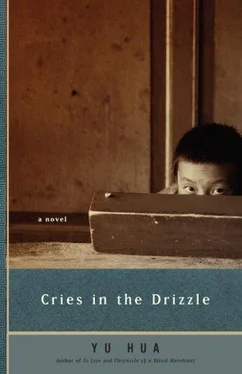I shook my head. I would see a little girl come out the gate, and her parents were often around, but I knew nothing about them.
Su Yu left as night fell. I watched as his stooping form disappeared on the road into town. Before the year was out, he was dead.
By the time I graduated from high school, the university entrance examinations had been reinstated. When I was admitted to college I had no chance to inform Su Yu as he had informed me about his job placement. I did see Su Hang on a street in town, but he and his buddies were on bicycles and they raced past me in high spirits.
I didn't tell my family that I was taking the entrance exam, and I borrowed the money for the registration fee from a classmate in the village. A month later, when I went to pay him back, he said, “Your brother already gave me the money.”
I was taken aback. After I received the notice of my admission, my brother put together some things that I would need. By this time my father was already having his affair with the widow across the way; he would often slip out of her bed halfway through the night and slip into my mother's. He was too preoccupied to give much thought to family matters. When my brother told him my news, he simply said offhandedly, “What! They're going to let him stay in school? The lucky devil!”
My father realized that this development signaled my long-term absence from home, and this put him in excellent spirits.
Mother had a fuller understanding of things. In the days immediately preceding my departure she would often look uneasily at my brother, for what she had really been hoping was that he would go to university. She knew that graduation from college assured your promotion to an urbanite.
When I left, only my brother saw me off. He walked in front, my bedroll on his back, and I followed close behind. Neither of us said a thing. Touched by the efforts he had made during the previous few days, I was looking for an opportunity to thank him, but the silence that enveloped us made it difficult for me to broach the topic. Only as the bus was about to depart did I blurt out: “I still owe you one yuan.”
My brother looked at me blankly.
“The registration fee, I mean.”
Now he understood, and a doleful expression appeared in his eyes.
“I'll pay you back,” I went on.
I watched him through the window as the bus lurched forward. My brother was standing underneath a tree, and I saw a stricken look on his face when the bus pulled away.
Not long after this, the land in and around Southgate was requisitioned by the county authorities for the construction of a textile mill, and the villagers were turned overnight into suburbanites. Although I was in faraway Beijing, I could easily imagine their excitement and anticipation. Even if some people ended up sobbing as they prepared to relocate, it seemed to me that their sadness was the inevitable sequel to the initial rejoicing. Old Luo, the storehouse janitor, shared with everybody one of his pearls of wisdom: “No matter how successful a factory may be, it will go bust eventually. You'll never be out of a job if you till the fields.”
But years later, when I returned to my home district, I ran into Old Luo in an alley in town, and the old man, dressed in a dirty, tattered cotton jacket, said to me proudly, “I'm living off my pension now.”
After I left Southgate for good, I never felt any attachment to my childhood home. For a long time I was convinced that memories of the past or nostalgia for one's birthplace really represent only a contrived effort to restore one's equilibrium and cope better with life's frustrations, and that even if some emotions arise these are simply ornamental. Once, when a young woman politely inquired about my childhood and hometown, I found myself enraged and retorted: “Why do you want me to accept a reality that I have already left behind me in the past?”
If anything about Southgate induces some nostalgia, it has to be the village pond, and when I heard that my birthplace had been appropriated for development, my first reaction was concern for the pond's future. That spot, which for me had been a source of comfort, would, I feared, just be buried and forgotten, the same way Su Yu had been buried and forgotten.
Some ten years later I went back to Southgate, returning alone one night to my home village. In its new incarnation as a factory, Southgate no longer projected a faint odor of night soil wafting on the evening breeze, nor could I hear the gentle swaying of crops. Despite all the changes I could still identify exactly where my old home once stood and the pond once lay. When I moved closer my heart couldn't help but skip a beat, for the moonlight revealed that the pond of my childhood was still there. As it came into view, an upheaval stirred within me. The memory of this pond had always offered me solace, but its appearance in the present now brought to life the very fiber of my past. Gazing at the refuse that littered its surface, I realized that the pond was more than just a provider of consolations; it served, rather, as an emblem of days gone by: far from fading in my memory, it still clung stubbornly to its place on Southgate's soil, an eternal reminder of what had been.
WEDDING
In those early days when I sat beside the pond, Feng Yuqing inspired endless yearning when she walked by, exuding youth and buxom beauty, wooden bucket in hand. As she approached the well she would move more cautiously. This circumspection in turn stirred an anxiety in me, a concern that she might lose her footing on the moss growing around the edge of the well. When she bent over to lower the bucket into the shaft, her braid would flop down over her chest and swing in an exquisite motion.
One particular summer — this was Feng Yuqing's last year in Southgate — I felt a different sensation as she walked by at midday. I caught a glimpse of her breasts quivering inside her floral blouse and my scalp went numb. A few days later, as I passed her house on the way to school, she was standing in the doorway, combing her hair in the first rays of the sun. Her head was slightly tilted to one side and the early morning sunshine bathed her sleek neck and caressed her shapely figure, while her raised arms clearly exposed to the daybreak breeze the lighter shade of hair in her armpits. These two scenes kept replaying in my mind, with the result that when I next saw Feng Yuqing I was conscious that I kept averting my gaze. My feelings for her were no longer as straightforward as they once had been, for budding desire was now bundled up with them.
I was surprised by something my brother Sun Guangping did one evening not long afterward. Now fifteen, he undoubtedly noticed her physical appeal earlier than I did. It was a moonlit night, and as Sun Guangping headed home with a bucket of water Feng Yuqing was walking in the direction of the well. In the instant when they passed each other, Sun Guangpings hand darted toward her breasts, only to rapidly withdraw. He then hurried homeward, while she was so shocked by his gesture that she stood there paralyzed, regaining her composure only when she saw me, at which point she continued on toward the well. I noticed that as she drew up the bucket she made a point of tossing her braid back over her shoulder whenever it fell over her chest.
For the next few days I was sure that Feng Yuqing would come to our house to lodge a complaint, or at the very least that her parents would. Sun Guangping often cast anxious glances out the door. But as time went on and the moment he was dreading never materialized, he gradually recovered his usual confidence. Once I saw him run into Feng Yuqing, and he gave an ingratiating smile while she simply brushed past him with a scowl.
Even my younger brother Sun Guangming was not immune to Feng Yuqing's charms. Ten years old, still clueless about sex, he greeted her once with a shout of “Big breasts!” He was sitting on the ground at the time, a grimy little boy toying with a scrap of brick. He gave a silly smile, and a thread of saliva dripped indiscreetly from the corner of his mouth.
Читать дальше












